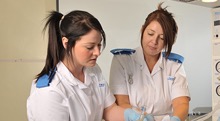Jane Wray, Senior Research Fellow, Director of Research, School of Health and Social Work, University of Hull

Finishing university and starting employment is an exciting time for newly qualified nurses. It’s the beginning of what is generally a long, successful and exciting career within the profession. It can, however, also be a stressful or challenging time as they make the transition from student nurse to registered, fully autonomous practitioner. Newly qualified nurses can feel that they are unprepared for their new role and the demands made upon them (Feng and Tsai, 2012); this can lead to stress and dissatisfaction (Edwards et al. 2015), and some decide to leave the profession within a year of qualifying. This results in significant personal costs for individual nurses and has an impact upon employers, organisations and patients.

As the debate continues over a shortage of nurses and safe staffing levels, employers are looking at different ways to better support newly qualified nurses. Adams and Gillman (2017) in their systematic review of strategies to support successful transition have recommended that support, socialisation and facilitated learning opportunities are all important elements of success during this period. In the UK, the one-to-one model of preceptorship is common (Whitehead et al. 2016), although group, team or peer support/mentoring is growing in popularity as this better reflects multi-disciplinary team working (Rejon and Watts 2014).
For student nurses who are about to start this journey, it is important that they prepare for this change in identity, status and their future careers. Higher education institutions can play a significant role by working with students to plan for a successful transition and develop strategies to better manage potential work-related stressors. The ‘Supporting Transition and Retention of newly registered nurses’ (STaR) project is funded by the Burdett Trust for Nursing and will be managed by myself and a team from the University of Hull. This three-year project is just getting underway and will bring together employers, students and qualified nurses, patients and academic staff, with the aim of supporting transition into the workplace and enhancing retention. This collaborative project will look at how best individual nurses can plan for transition as part of their exit strategy from university and effectively take control and manage this process post-qualification.
If you would like more information about the project or are interested in becoming involved then please contact Jane Wray (J.Wray@hull.ac.uk) 01482 464618
References
Adams, J.E. and Gillman, L. (2017) Developing an evidence based transition program for graduate nurses. Contemporary Nurse, 52(5), 511-52.
Edwards, D., Hawker, C., Carrier, J. and Rees, C. (2015) A systematic review of the effectiveness of strategies and interventions to improve the transition from student to newly qualified nurse. International Journal of Nursing Studies, 52(7) 1254-68
Feng, R. and Tsai, Y. (2012). Socialisation of new graduate nurses to practising nurses. Journal of Clinical Nursing, 21(13–14), 2064–2071.
Rejon, C.J., and Watts, C. (2014) Supporting professional nurse socialisation: Findings from evidence reviews. Royal college of Nursing: London. Accessed 25th May 2017, Available at: https://www2.rcn.org.uk/__data/assets/pdf_file/0010/559225/Socialisation_review_REDRAFT_CW_03_01_14.pdf
Whitehead, B., Owen, P., Henshawa, L., Beddinghamb, E. and Simmons, M. (2016) Supporting newly qualified nurse transition: A case study in a UK hospital. Nurse Education Today, 36 (2016) 58–63